The battle between the most popular browsers is constantly evolving, and it’s absurd to keep insisting on points when their veracity has been questionable for years now. Explorer, for example, is not unsafe, nor is Firefox slow. This is why we’ve done a comparison between the four most popular browsers for their loading speed, memory usage, and performance.
Test equipment and analysis conditions
The machine used to do this analysis was a Sony Vaio Intel Core i5 2.5GHz laptop with 4GB of RAM and Windows 8.1 x64 recently installed. The computer is fully optimized and only has the programs installed that are indispensable for the boot and good functioning of the system. The four browsers chosen for the analysis were installed from zero and do not include any sort of add-ons or extensions. These are the versions:
- Mozilla Firefox 29
- Google Chrome 34
- Internet Explorer 11
- Opera 20
The aim of the study is to offer transparent information that any user, no matter their level of experience, can understand. Thus, we’re going to break down the evaluation into three main parts: memory usage, loading speed, and performance, leaving the specific features of each to a later article.
Memory usage
Browser’s memory usage is an important factor to take into account, especially if you’re running low on RAM on your machine. For this segment we have evaluated the initial launch status of the browser without any pages loaded and with five open tabs (Uptodown, TrenchPlay, Google, Wikipedia, and a blank page). None of the browsers loaded any sort of extensions or extras, and the memory calculation was done based on all the processes launched by the browser.
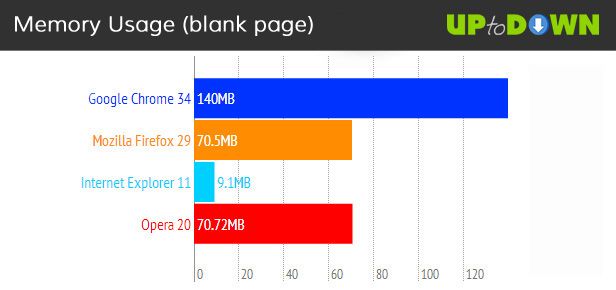
When “resting,” Internet Explorer 11 won in terms of low usage of resources since many of its processes are already integrated into the operating system, making the difference in memory after loading the page insignificant. In fact, with five open tabs it’s the one that consumes the fewest resources. What it doesn’t do very well is to free up memory after use, meaning that even when you close it more than 70MB of memory is taken up by browser processes.
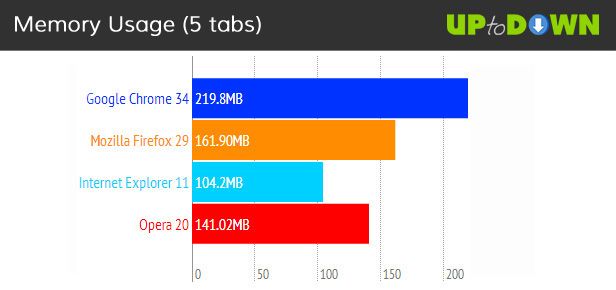
This data must be evaluated in context, since it’s possible for the Microsoft browser’s actual usage to be greater if you take into account the prior weight of programs resident on Windows as well as temporary files that can “balloon” suspiciously. However, as we’ve already mentioned, the aim of this test is to supply data understandable for all sorts of users. That said, on the other side of the scale is Chrome, which uses more than 200 MB with only four open tabs. Given these results, if you have to choose one of these for the balance of its memory use and its “tidiness” in the background you should undoubtedly choose Opera.
Boot time
Startup times have reduced substantially in recent years, and the long waits of up to 15 seconds on slower machines in the most “dramatic” versions of Firefox are now a thing of the past. To measure these time lapses we’ve used the free tool AppTimer.
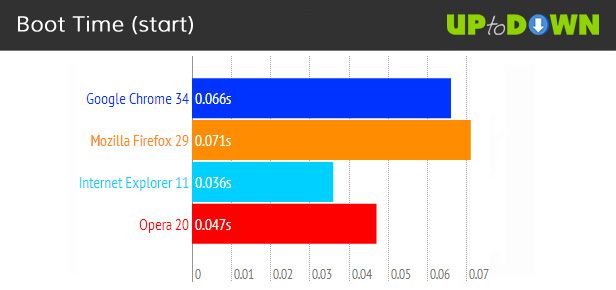
In this case, two reference times have been taken: that of a cold boot with the operating system recently started and then a later boot after having run it already once, with the latter time being shorter since certain browser elements stay loaded in memory. In both cases Internet Explorer 11 wins again, another detail that shows how different the Microsoft browser’s relationship is with the operating system compared with the others.
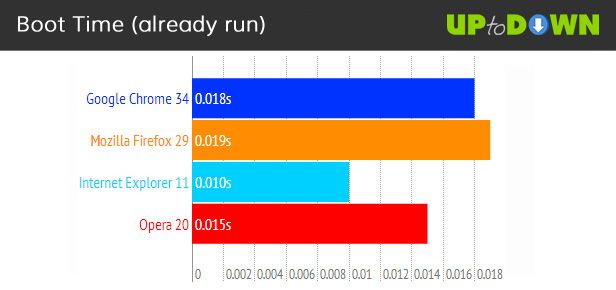
And again, Opera comes in second place in a category; from a cold boot it can run in scarcely half a second.
Performance
It’s very complicated to get reliable performance results based on a concrete benchmarking tool, since the data obtained can depend on the type of calculation being done and even the tool’s developer. Thus, the best way to do this evaluation is by taking several sites and measures as a reference to look for common patterns.
Speed Battle is a webpage that registers a series of performance data for each user that visits the page and runs the test it offers, automatically cooking up a ranking showing which browsers obtain the best results based on three evaluated factors: calculation speed, storage speed, and rendering speed. If you go by these results, Firefox has killed its competitors practically since its version 18, with Chrome 34 in tenth position.
For JavaScript loading we’ve used two analysis tools of the many out there. According to SunSpider, Internet Explorer 11 again has the best result, while KrakenBenchmark shows the winner to be Firefox (maybe because the tool is developed by Mozilla itself, an issue we mentioned before ;-) ).
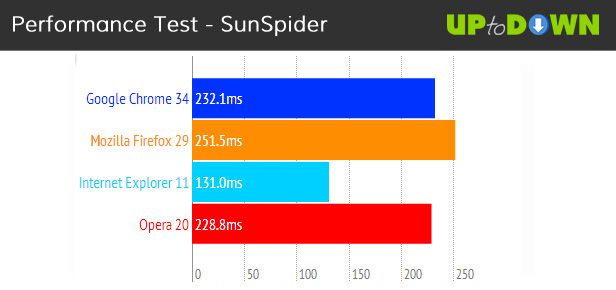
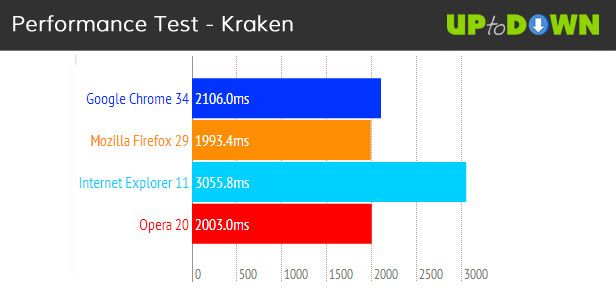
PeaceKeeper is a benchmark tool that bases most of its tests on general page rendering operations and calculations with HTML5. In this case, Chrome and Opera are practically tied at the top in their results. Explorer, on the other hand, gets the lowest marks, making clear what upgrades will be needed in future versions. You can check the results on this image
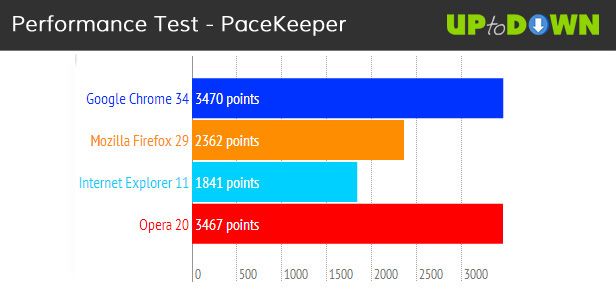
Conclusions
Obviously, the analysis of these features is totally biased and related to the features of the computer on which the tests themselves are run, but nevertheless we can take away quite a few revealing conclusions.
Comparing all the evaluated aspects, the browser that offers the best global results is undoubtedly Opera, which beats both Chrome and Firefox in terms of speed and resource use. The latter two, on the other hand, continue to improve their numbers even as they include ever more features by default and may be a bit more baroque in their use. There are even some who complain that the Google browser has an “operating system complex”, although it’s quite clear that these are in fact its intentions in the medium term.
The big surprise is Internet Explorer 11. Microsoft has managed to give a much-needed facelift to the brand buffeted by past errors. Although it’s difficult to compare it with the other browsers and its impact on general system performance remains to be worked out, it’s an excellent alternative that should come back into the game among the heavyweights.













Firefox
Firefox
cv
Firefox
I would use opera if it weren’t for the usability quirks…
Firefox is the best!!!
And Internet Explorer sucks ¬¬
Opera is the best, it runs beautifully and looks great. Plus it is easy to use and has an amazing homepage
Internet Explorer 11 won in every test but one, and you pick Opera as the winner !?
WHAT THE FUCK ?
He lost the most important tests, the performance tests (2 of them).
agreed, this makes no sense. And IE only lost one performance test. It won two.
I vote for Camelion browser, ITS the BEST!
CAMELION browser is the best mates!
the charts show internet explorer winning in like 9 of 10 categories, and then the conclusion says that Opera is the winner. What?
The author didn’t want to get crucified by the web development community for giving IE a good result… there is still much hatred out there because of previous versions.